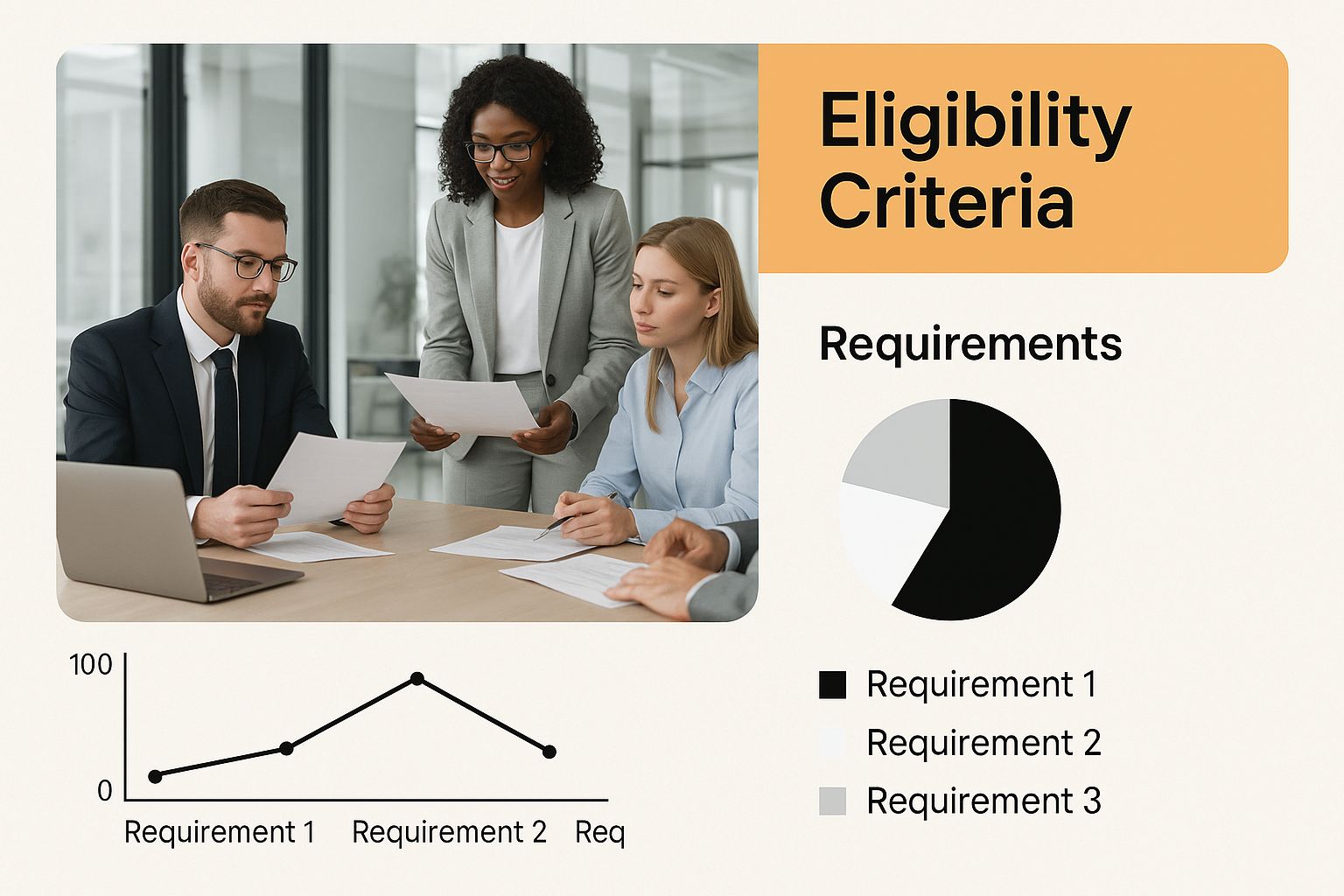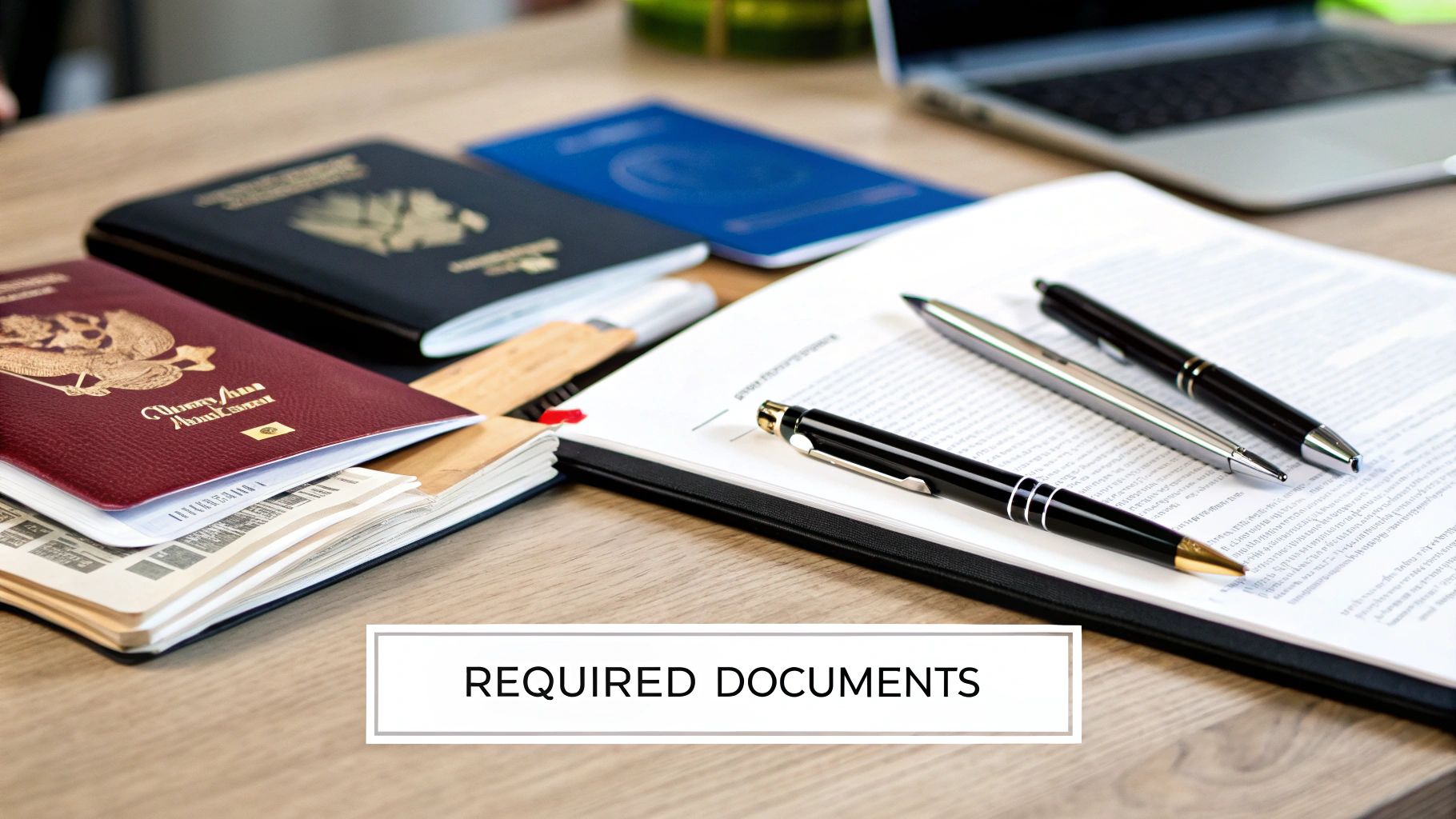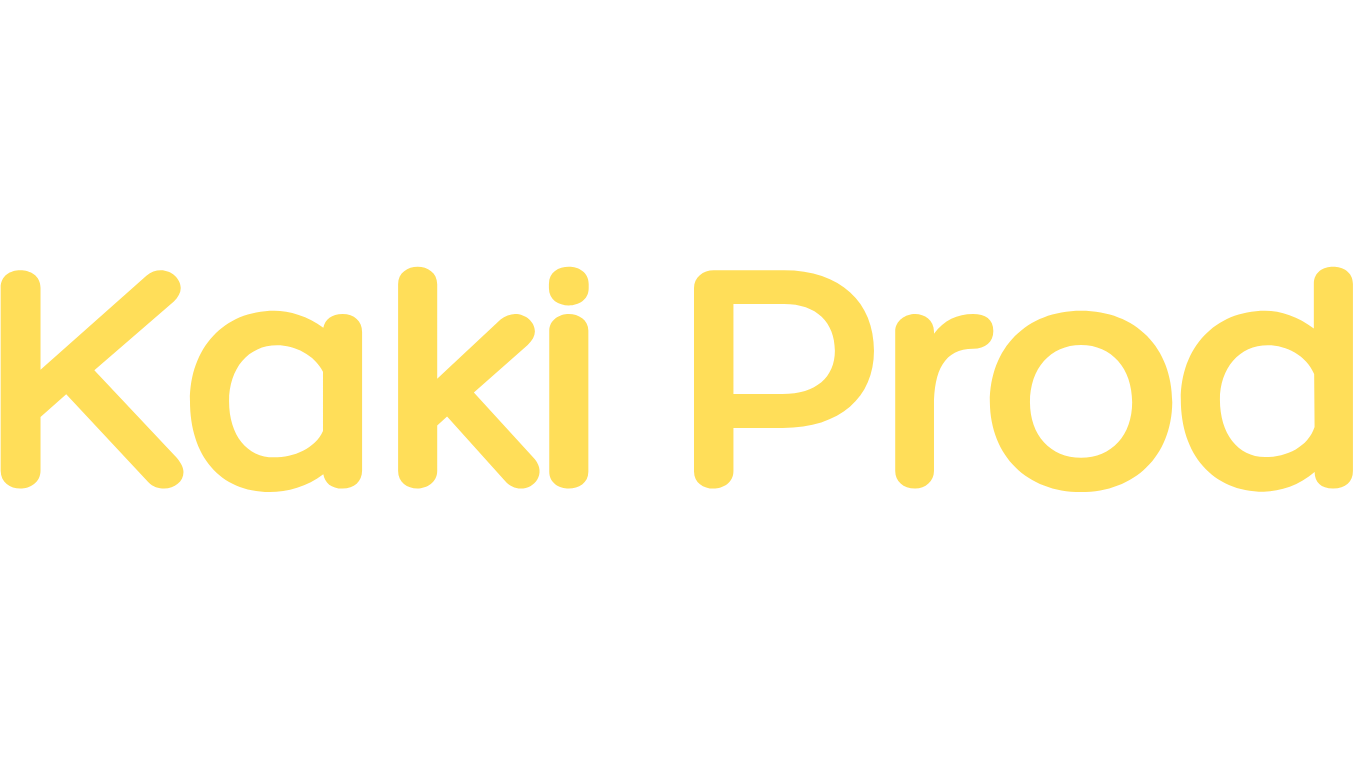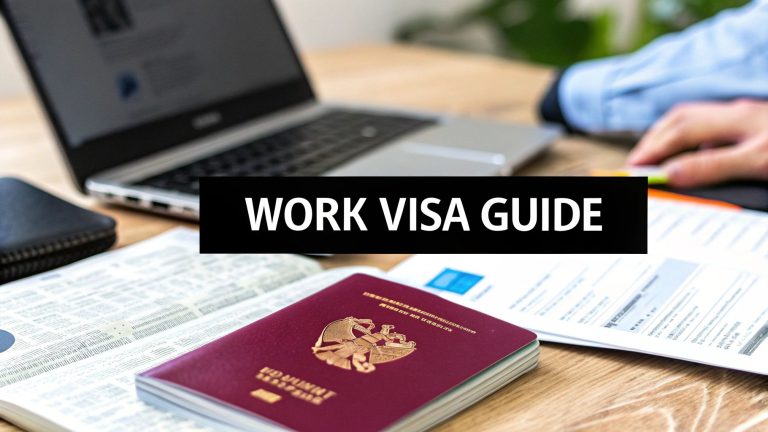So, you’re eyeing a career in Germany? Smart move. But before you can dive into bratwurst and the Autobahn, you’ll need to tackle the German work visa. It might seem like a mountain of paperwork, but it boils down to a few key things the German authorities really care about.
Think of it less as a bureaucratic nightmare and more like a checklist to prove you’re ready to hit the ground running.
What Are the German Work Visa Requirements?
Getting a German work visa isn’t as complicated as it looks once you get what the officials are after. Their main goal is simple: make sure anyone coming to work in Germany can actually, well, work and support themselves without any trouble. It’s a system designed to bring in skilled people smoothly.
At the end of the day, Germany needs talent. The entire visa process is just their way of verifying you’ve got the skills and a solid plan.
The Core Pillars of Your Application
Your application needs to stand on three strong legs. Get these right, and you’re in a great position.
- A Confirmed Job Offer: This is the big one. You need a signed, sealed, and delivered employment contract from a German company. This can’t just be any gig, either—it has to be a qualified position where your salary and work conditions are on par with what a German national would get.
- Recognized Qualifications: Your degree or vocational training needs to be up to snuff. German authorities must either officially recognize it or consider it equivalent to a German qualification. The Anabin database is your best friend here; it’s an online tool where you can check how your credentials stack up.
- Financial Stability and Health Coverage: You have to show you can cover your own expenses until that first paycheck lands in your bank account. On top of that, getting a German-approved health insurance plan is non-negotiable—they won’t issue the visa without it.
Practical Example: Imagine a mechanical engineer from Mexico receives a job offer from a manufacturing firm in Stuttgart. For her visa application, she must provide: 1) The signed employment contract. 2) A Statement of Comparability for her engineering degree from the ZAB (Central Office for Foreign Education). 3) Proof of travel health insurance and a blocked bank account with funds to cover her first month’s living expenses.
Why These Requirements Matter
These rules aren’t there just to give you a headache. They protect both you and Germany’s job market.
That mandatory job offer? It ensures you have a secure spot waiting for you. Verifying your qualifications? That keeps professional standards high across the board. It’s a pretty logical system for bringing in new talent without causing chaos. You can get a better sense of how your background will be judged by checking out this guide on the skills assessment process for international professionals.
Once you get your head around these foundational work visa Germany requirements, you can gather your documents without breaking a sweat. From here, we’ll get into the nitty-gritty of each visa type and give you a clear roadmap for your application.
Choosing the Right German Work Visa for You
Thinking about working in Germany? Awesome. But here’s the first thing you need to know: there isn’t just one “German work visa.” Instead, Germany offers a handful of specialized options, each built for different types of professionals.
It’s like trying to find the right key for a specific door. Picking the one that actually fits your professional background and career goals is your first—and most important—step. Whether you’re a recent grad with a killer job offer, a seasoned IT pro, or a skilled tradesperson, there’s a specific path for you.
Let’s break down the most common options so you can figure out exactly which one is your golden ticket.
The EU Blue Card for Highly Qualified Professionals
The EU Blue Card is Germany’s VIP pass for highly skilled professionals coming from outside the EU. Think of it as the fast track, designed to attract top academic talent by offering a quicker route to permanent residency and a bit more flexibility.
So, what does it take to get one? It really boils down to two things:
- A university degree that Germany recognizes as equivalent to its own.
- A solid job offer with a gross annual salary hitting a certain minimum. For 2024, that magic number is €45,300. It drops to €41,041.80 for jobs in high-demand fields like IT, engineering, and healthcare, which they call “shortage occupations.”
Practical Example: A data scientist from India with a Master’s in Computer Science lands a job at a Berlin tech startup. Her salary is €60,000. Because her degree is recognized and her pay is well above the threshold for IT professionals, she’s a perfect candidate for the EU Blue Card. This visa will allow her to apply for permanent residency in as little as 21 months if she maintains a B1 German language level.
The Skilled Worker Visa for Professionals
But what if your skills are more hands-on and vocational, not necessarily from a university? That’s where the Visa for Skilled Workers (or Fachkräftevisum) comes in. This visa is the go-to for professionals who have completed either a university degree or a qualified vocational training program that’s officially recognized in Germany.
The main difference from the Blue Card is its wider net. It covers a much broader range of jobs, including many essential skilled trades. The catch? You absolutely must have a job offer that lines up directly with your qualifications.
This image really drives home how critical your qualifications and job offer are, no matter which visa you’re chasing.

As you can see, these two elements are the foundation of any successful application. Get them right, and you’re already halfway there.
To help you get a clearer picture, here’s a quick rundown of how these visas stack up against each other.
Comparing Common German Work Visa Options
This table is a quick cheat-sheet to help you pinpoint the best German work visa for your profile and goals.
| Visa Type | Ideal Candidate Profile | Core Requirement | Path to Permanent Residence |
|---|---|---|---|
| EU Blue Card | Academics & high earners with a university degree. | Recognized degree + job offer with a salary of at least €45,300 (or €41,041.80 in shortage fields). | Fast-tracked. Possible after just 21-33 months. |
| Skilled Worker Visa | Professionals with a recognized university degree or vocational training. | Recognized qualification + a matching job offer. | Standard route. Typically possible after 4 years of holding the permit. |
| IT Specialist Visa | Experienced IT pros without a formal degree. | 3+ years of relevant IT experience + a job offer with a minimum salary. | Standard route, similar to the Skilled Worker Visa. |
| Job Seeker Visa | People who want to find work after arriving in Germany. | Recognized degree + sufficient funds to support yourself for 6 months. | Not a direct path. You must find a job and switch to a work visa first. |
Seeing the options side-by-side makes it easier to spot where you fit. The right choice really depends on your specific credentials—a university degree, vocational training, or pure, hard-earned experience.
Specialized Visas for Specific Needs
Germany’s visa system is smart. It has special pathways designed to fill specific gaps in its economy.
- IT Specialists Visa: This one’s a game-changer. No formal degree? No problem. If you have at least three years of proven, hands-on IT experience and a job offer that meets the salary minimum, you can get a work visa. It’s a nod to the fact that in the tech world, what you can do often matters more than a piece of paper.
- Job Seeker Visa: This is for the bold. It lets you move to Germany first and then hunt for a job. You get a full six months to be on the ground, hit up interviews, and land a contract. Once you’ve got that offer, you can apply for your EU Blue Card or work visa right from within Germany—no need to leave. You can get a better sense of what that adventure looks like by exploring resources on navigating the job relocation process.
- Freelancer Visa: Planning to be your own boss? You’ll need a residence permit for freelance work. This path is a bit more involved. It requires a bulletproof business plan, proof you can fund yourself, and evidence that your entrepreneurial venture will actually bring some benefit to the German economy.
Making the right choice from the get-go will save you a world of headaches and time. If you carefully match your professional story to one of these visa options, you’re setting yourself up for a much smoother and more successful move to Germany.
The Universal Checklist for Your Visa Application
No matter which German work visa you’ve set your sights on, some requirements are simply universal. Think of this as the bedrock of your application—the non-negotiable items every single applicant has to get right.
Consider this your master checklist. It covers the foundational documents and approvals German authorities need to see before they even look at the specifics of your case. Nail these, and you’ve built a strong launchpad for your application.

Foundational Documents Everyone Needs
Before you get lost in visa-specific forms, every applicant has to gather a core set of personal and professional documents. These items prove who you are, what you can do, and that you have a real reason to work in Germany.
- A Valid Passport: This might seem obvious, but your passport must be valid for your entire stay, plus an extra three months. It also needs at least two blank pages for that all-important visa sticker.
- A Binding Job Offer and Contract: This is the absolute cornerstone of your application. You need a signed employment contract from a German company that clearly outlines your role, responsibilities, and salary.
- Official Recognition of Your Qualifications: Your university degree or vocational training certificate has to be officially recognized or considered comparable to a German one. The Anabin database is the go-to tool for checking this.
The path to a German work visa has a few key milestones, especially for skilled workers. It all starts with that job offer, and the salary has to meet certain thresholds. For high-demand sectors like STEM and healthcare, for example, the salary requirement is a bit lower, sitting at €43,759.80 as of early 2025.
For regulated professions like medicine and engineering, official qualification recognition is mandatory. If you’re in a non-regulated field like IT or finance, you can often skip that step. Once you’ve got your ducks in a row, you can finally submit the application.
The Critical Hurdle: The Federal Employment Agency
Once you submit your application, it doesn’t just sit at the embassy. A crucial part of the process is getting the green light from the Federal Employment Agency (Bundesagentur für Arbeit – BA).
The BA’s job is to check if your employment conditions—especially your salary and working hours—are fair and on par with what a German employee would earn in a similar role. This step, known as the Vorabzustimmung or pre-approval, is there to protect the local job market and make sure you aren’t being underpaid.
Practical Example: An architect from Brazil applies for a visa with a job offer in Munich. The German embassy forwards the application details to the BA. The BA then compares the offered salary against the average for architects in Bavaria to ensure it meets the local standard before giving its approval.
Proving Your Financial Stability and Health
Beyond your job, German authorities need to know you can support yourself financially and have proper healthcare.
Proof of Financial Support
You have to prove you can cover your living expenses from the day you land until you get your first paycheck. This is usually done by depositing funds into a special blocked bank account, or a Sperrkonto. The required amount is typically based on the BAföG rate, which is about €934 per month.
Mandatory Health Insurance
You can’t get a German work visa without proof of adequate health insurance. Period. You must be covered from your very first day in Germany. Many people start with a travel health insurance policy that covers the initial period, then switch to a German public or private provider once they arrive.
Getting these universal requirements right is a huge step toward getting your visa approved. To get even more granular, check out our detailed guide on the German work permit and its specifics.
Navigating the Application Process From Start to Finish
You’ve picked the right visa and rounded up your essential documents. Now for the real work: the step-by-step slog of actually applying. Think of it like assembling a piece of high-quality German furniture—every part needs to be fitted correctly, and in the right order, or the whole thing will wobble. This walkthrough will guide you from prepping your professional portfolio all the way to that nail-biting wait for the final decision.

This guide breaks the entire journey into manageable chunks, with tips to make sure every piece of your application meets the famously high standards of German authorities. Let’s start with the first hands-on step: getting your professional documents in order.
Step 1: Prepare Your German-Standard Documents
Your CV and motivation letter are your first impression on the German authorities. They need to be perfect and, more importantly, follow local customs, which can be worlds away from what you’re used to. A standard German CV, or Lebenslauf, is almost always tabular, straight-to-the-point, and absolutely must include a professional photo.
A solid motivation letter is just as crucial. This isn’t just a formality; it’s where you connect the dots for the visa officer. You need to explain why Germany, why this specific company, and how your skills are the solution to their problems.
Tips for Standout Documents:
- CV Formatting: Two pages max. List your experience in reverse chronological order, starting with your most recent job.
- Motivation Letter Content: Get specific. Talk about your long-term career goals in Germany and show exactly how this job is the next logical step.
- Professional Photo: This is non-negotiable. It’s worth investing in a proper headshot with a clean, neutral background.
Step 2: Book Your Appointment and Fill the Form
With your documents polished, your next move is to lock in an appointment at the right German mission—that’s the embassy or consulate—in your home country. These appointment slots can be surprisingly scarce, especially in peak season, so book as far out as you can. You can usually apply up to 90 days before you plan to travel.
Next up is the visa application form itself. You can often tackle this online through the VIDEX portal or download it directly from your local embassy’s website. Be meticulous here. Even tiny mistakes can cause major delays or even get your application tossed out.
Practical Example: An engineer from Canada is applying for her visa. She checks the German Consulate in Toronto’s website and sees the next open slot is six weeks away. She snags it immediately. She then uses that time to painstakingly fill out the VIDEX online form, double-checking every single entry against her passport and job contract before printing.
Step 3: Ace Your Visa Interview
The visa interview is your chance to make a human connection and a great impression. The consular officer’s job is to verify everything in your application and make sure your intentions are legitimate. Be ready to talk about your job, your qualifications, and what your plans are in Germany.
Walk in with your documents organized in a folder: passport, application form, photos, job contract, qualification proofs, and insurance confirmation. A well-organized file screams “I’m serious and prepared.”
Common Interview Questions to Prepare For:
- “Can you describe your role at the company in Germany?”
- “Why do you want to work in Germany specifically?”
- “How did you find this job?”
- “What are your long-term plans?”
Step 4: After the Submission: What to Expect
Once you’ve submitted everything and had your interview, the waiting game begins. Processing times are all over the map, typically running anywhere from two to eight weeks. It can take longer, though, depending on the embassy’s workload and whether your file needs a more detailed check by the Federal Employment Agency back in Germany.
You can usually track your application’s status through the same portal where you applied. My best advice? Be patient. Once you get the green light, you’ll be notified to bring in your passport for the visa sticker. That’s your ticket to Germany and the start of a whole new chapter.
Why Germany Wants You: Skilled Workers Are in Demand
Trying to meet German work visa requirements can feel like you’re the only one doing all the work. It’s easy to get bogged down in the paperwork and think it’s all about proving yourself. But here’s the thing—you need to flip that script. This isn’t just about you wanting to get into Germany; it’s about Germany actively needing people with your skills.
Once you get that, everything changes. The whole application process stops feeling like some bureaucratic nightmare and starts feeling like what it really is: a smart career move into a country where you’re genuinely wanted.
Germany’s Growing Need for Talent
Let’s be real: Germany has some serious labor shortages in key industries. For its economy to keep humming along and driving innovation, it needs a constant flow of qualified professionals. Because of this, the German government isn’t just sitting back—it’s actively rolling out the welcome mat for international talent.
So, behind every single form you have to fill out, there’s a solid economic reason. They aren’t just looking for warm bodies to fill seats; they are searching for skilled pros to plug critical gaps. The biggest holes are in:
- Information Technology (IT): Software developers, data scientists, and cybersecurity gurus are in hot demand.
- Engineering: With its massive industrial and manufacturing sectors, Germany constantly needs mechanical, electrical, and civil engineers.
- Healthcare: Doctors, nurses, and other medical professionals are vital to keeping the public health system strong.
- Skilled Trades: The backbone of the economy—electricians, mechanics, and construction workers—are needed urgently.
This isn’t just talk; the numbers back it up. Germany has been on a work visa approval spree, granting a whopping 579,000 work visas between 2021 and 2024. The figures have climbed year after year, hitting a peak of 172,000 in 2024. That’s a 77% jump in just four years, proving Germany is serious about bringing in global talent. You can read more about this boom in skilled migration to see just how proactive they’re being.
A System Designed for You
Knowing this should give you a major confidence boost. As you gather your documents to meet the work visa Germany requirements, remember that you are a valuable commodity. Germany created specific pathways like the EU Blue Card and the Skilled Worker Visa precisely to make it easier for qualified people like you to come over. That’s a pretty clear signal that your skills are not just recognized but actively sought after.
Practical Example: An electrician from South Africa with certified vocational training in their field is a perfect candidate for the Skilled Worker Visa. Germany faces a significant shortage of skilled tradespeople. By recognizing the electrician’s qualifications, Germany fills a crucial gap in its labor market, and the electrician gains access to a stable, well-paying job. This is a win-win scenario created by the system.
This mindset should power you through the process. Germany isn’t some locked fortress; it’s a country with its doors wide open for the right professionals. The system is literally built to help you get there. For more on this, check out our visual guide on the essentials of skilled migration.
The Future of German Immigration and What It Means for You
Germany’s immigration laws aren’t just sitting on a shelf collecting dust—they’re being actively rewritten to roll out the red carpet for skilled professionals like you. Paying attention to these changes is a must, because they can seriously upgrade your application strategy and boost your odds of success. Germany isn’t just maintaining its immigration system; it’s giving it a major overhaul.
The country’s entire approach has become way more flexible and down-to-earth, especially with the game-changing Skilled Immigration Act. Think of these reforms as a massive flashing sign from Germany that says, “We’re cutting the red tape and making it easier for global talent to get in.”
Key Changes You Should Know
These recent rule changes have introduced some seriously practical updates that make clearing the work visa Germany requirements much more doable. The whole point is to tear down old walls and open up new doors for a much wider range of professionals.
- Simpler Paperwork: The government is on a mission to make the application process faster and a whole lot less complicated.
- Lower Salary Hurdles: For jobs in high-demand fields, the minimum salary you need for visas like the EU Blue Card has been lowered, opening the door for more applicants.
- Brand-New Pathways: Germany rolled out some fresh, innovative options like the ‘Opportunity Card’ (Chancenkarte), which is a points-based system that lets you move to Germany first and then hunt for a job.
This shift is like Germany upgrading its immigration system from a narrow, winding country road to a multi-lane superhighway. There are now more routes to get there, and the whole journey is designed to be smoother and faster for qualified people.
To sweeten the deal even more, Germany is planning to crank up the number of work visas it issues in 2025. The government is shooting for an extra 22,422 work visas, which is a 10% jump from the year before. This move is a direct answer to the 639,000 unfilled jobs across the country, especially in hot sectors like engineering, IT, and healthcare. You can get the full scoop on Germany’s increased visa targets for skilled workers.
What This Means for Your Application
So, what’s the bottom line for you? It means you’re applying to a system that is actively getting easier and more welcoming by the day. Your qualifications might suddenly fit a new visa category you hadn’t considered, or that job offer you have might now clear a recently lowered salary bar.
By keeping an eye on these trends, you can position your application to take full advantage of this modern, more inviting immigration landscape. It’s a clear signal that your skills aren’t just needed—they’re genuinely wanted.
Frequently Asked Questions (FAQ)
Navigating the German work visa requirements often brings up specific, practical questions. Here are clear answers to some of the most common ones to help you finalize your application with confidence.
Do I need to speak German to get a work visa?
Not always, but it helps immensely. For many roles in international companies or the tech sector, English may be sufficient for the job itself, and you can obtain a work visa without German skills. However, proving at least basic German knowledge (A1 level) strengthens your application by showing your commitment to integrating. For long-term settlement or permanent residency, a higher level (B1) is almost always required.
Can I bring my family with me to Germany?
Yes. Holders of an EU Blue Card or Skilled Worker Visa can typically bring their immediate family (spouse and minor children) through a process called family reunification. To do this, you must prove you can support them financially without relying on public benefits and have adequate living space for your entire family. Your family members will need to apply for their own visas at the German embassy in your home country.
How much money do I need to show for a work visa?
This depends. If you’re applying for a Job Seeker Visa, you must show you have funds to cover your entire 6-month stay (around €1,027 per month). For a standard work visa where you have a job offer, you typically only need to prove you can cover your living costs until your first salary is paid. This is often done with a blocked account (Sperrkonto) containing one month’s living expenses or a declaration from your employer stating they will cover these costs.
What happens if my visa application is rejected?
A rejection is not the final word. The embassy will provide a letter explaining the reasons for the refusal. You have two main options:
- File a Remonstration: This is a formal appeal where you write to the embassy and argue why the decision was incorrect, providing additional evidence if necessary.
- Re-apply: Carefully review the rejection reasons, correct the issues (e.g., provide a missing document, get a more detailed job description), and submit a new, stronger application.
Can I switch jobs on a German work visa?
Yes, but you may need permission. Your initial residence permit is often tied to your specific employer. If you want to change jobs, you’ll likely need to get approval from the local Foreigners’ Authority (Ausländerbehörde). They will check if your new job still meets the visa requirements (e.g., it matches your qualifications and meets salary thresholds). For EU Blue Card holders, this process becomes much simpler after the first 12 months of employment.
Beyond the paperwork, understanding the practical side of healthcare is a huge concern for most people moving to Germany. For a full breakdown of what to expect, check out our guide on expat healthcare in Germany.
Planning a move abroad is a massive undertaking, but you don’t have to figure it all out alone. KakiProd offers a huge library of resources, detailed guides, and practical tools to back you up on your international journey. Head over to https://kakiprod.com to explore our expert advice and make your relocation a success.

